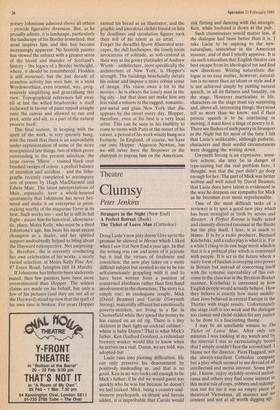Theatre
Clumsy
Peter Jenkins
Strangers in the Night (New End) A Perfect Retreat (Bush) The Ticket of Leave Man (Cottesloe) Doug Lucie's new play doesn't live up to the promise he showed in Heroes which I liked when! saw it at New End a year ago. In that the writing was raw and some of it jejeune but it had the virtues of freshness and conviction; the new play takes on a more difficult subject but seemed to me to be too self-consciously grappling with it and to have been written from a position of concerned aloofness rather than first-hand involvement in the characters. The story is a simple one; an inadequate couple, Mick (David Beames) and Carole (Gwyneth Strong), materially affluent but emotionally poverty-stricken, are living in a flat in Chesterfield while they spend the money he has earned on an oil rig. There is a tiny skeleton in their light-up cocktail cabinet — where is baby Daren? That is what Mick's father, Ken (Satford Gordon), a redundant brewery worker would like to know when he arrives on a visit. Daren, we are told, was adopted. but . . .
Lucie runs into plotting difficulties'. He can only preserve his denouement by positively misleading us, and that is no good. Ken in no way looks old enough to be Mick's father; if he did we would guess too quickly who he was but because he doesn't we feel tricked. Mick, being a country-andwestern psychopath, ex-drunk and heroin addict, it is improbable that Carole would risk flirting and dancing with the stranger, Ken, while husband is down at the pub.
Such clumsinesses would matter less, if the dialogue had been better than it is. I take Lucie to be aspiring to the newnaturalism, somewhat in the • American manner, and of that I wholly approve. It is via such naturalism that English theatre can best escape from its ideological rut and find new directions. Writing naturalistic dialogue is no easy matter, however; naturalism is no more than an idiom or style and it is not achieved simply by putting natural speech, in all its flatness and banality, on the stage. However inarticulate in life, characters on the stage must say surprising and, above all, interesting things; they must tell us more than we know; and if their prosaic speech is to be convincing or moving, it must have a tinge of poetry to it. There are flashes of such poetry in Strangers in the Night but for most of the time I felt that Lucie's unlikeable, although pathetic, characters and their sordid circumstances were dragging the writing down.
Gwyneth Strong is an expressive, sensitive actress; she may be in danger of type-casting but the real problem here, I thought, was that the part didn't go deep enough for her. The part of Mick was better written and well acted by David Beames; that Lucie does have talent is evidenced in the way he deepens our sympathy for Mick as he becomes ever more reprehensible.
One of the most difficult tasks of a reviewer is to spot a good new play which has been 'strangled at birth by actors and direotor. A Perfect Retreat is badly acted and clumsily directed (unusual at the Bush) but the play itself, I fear, is as much to blame. It is by a radio producer, Bernard Krichefski, and a radio play is what it is. For a while I eking to its one huge merit which is that it is a political play which is concerned with people. It is set in the future where a nasty form of fascism is creeping into power in Britain but instead of concerning itself with the systemic inevitability, of this outcome to the class war in the Brenton-Barker manner, Krichefski is interested in how English people would actually behave. How they behave is exactly how many middleclass Jews behaved in central Europe in the Thirties with tragic results. Unfortunately the stage craft is too weak and the dialogue too clumsy and cliché-ridden for any justice to be done to a fascinating theme. I may be an unreliable witness to The Ticket of Leave Man. After only ten minutes I was looking at my watch and by the interval I was so excruciatingly bored that I simply couldn't face the second half. blame not the director, Piers Haggard, nor the always-excellent Cottesloe company but a play which seemed to me devoid of all intellectual and moral interest. Some people, I know, enjoy stylishly-revived melodrama and others may find some interest in this moral tale of cops, robbers and reclemPtion but for me it was an empty piece of theatrical Victoriana, all manner and n° content and not at all worth digging U.






































 Previous page
Previous page